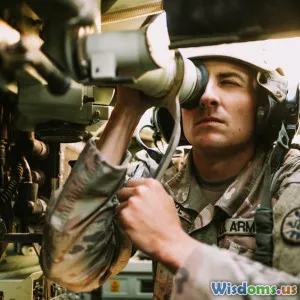
التحديات في تكنولوجيا الدفاع
(Challenges in Defense Technology)
5 मिनट पढ़ें استكشاف التعقيدات والعقبات التي تواجه تكنولوجيا الدفاع الحديثة في تطوير حلول عسكرية متقدمة. (0 المراجعات)
Challenges in Defense Technology
In an era where military technology is advancing at lightning speed, the defense sector faces unprecedented challenges. From the integration of artificial intelligence to the complexities of cyber warfare, understanding these hurdles is crucial for developing effective future weapons systems.
Funding and Budget Constraints
One of the most significant challenges in defense technology is securing adequate funding. With global military budgets under constant scrutiny, defense projects often compete with other national priorities such as education and healthcare. This competition can lead to delays in research and development, hampering the progress of innovative technologies.
For instance, the Pentagon's budget for advanced weapon systems has fluctuated in recent years, impacting ongoing projects like the Next Generation Air Dominance (NGAD) program, which aims to develop a new family of air combat systems.
Cybersecurity Threats
As military systems become increasingly interconnected, they become more vulnerable to cyberattacks. Cybersecurity is a critical concern for defense technology, as successful breaches can lead to unauthorized access to sensitive military data or even manipulation of weapon systems.
For example, the 2007 cyberattack on Estonia demonstrated the potential damage that can occur when military and government systems are compromised. Defense organizations must prioritize cybersecurity to protect their assets, requiring continuous investment in advanced encryption techniques and cyber defense strategies.
Ethical and Legal Dilemmas
The incorporation of cutting-edge technology, such as autonomous weapons and artificial intelligence, raises significant ethical and legal questions. The debate centers on whether machines should be allowed to make life-and-death decisions without human intervention.
The development of lethal autonomous weapon systems (LAWS) has sparked discussions among policymakers, ethicists, and military leaders about accountability and moral implications. The challenge lies in establishing regulations that govern the use of such technologies while ensuring national security.
Rapid Technological Advancements
The pace of technological advancements poses another challenge. Emerging technologies such as quantum computing and biotechnology can disrupt traditional defense paradigms, making it difficult for defense organizations to keep pace. Adapting to these changes requires flexible strategies and a willingness to innovate.
Moreover, as countries race to develop advanced weaponry, there is a risk of an arms race revolving around new technologies, which could destabilize global security. The challenge for defense organizations is to strike a balance between innovation and responsible development.
Collaboration and Integration
With the increasing complexity of defense technology, collaboration between military branches, private sectors, and international partners is essential. However, differing priorities and bureaucratic hurdles can impede effective cooperation. To overcome these challenges, defense organizations must foster an environment that encourages collaboration and knowledge sharing.
For instance, initiatives like the Defense Innovation Unit (DIU) in the United States aim to bridge the gap between the private tech sector and military needs, facilitating the rapid integration of innovative solutions into defense strategies.
Conclusion
The challenges in defense technology are multifaceted, ranging from funding constraints and cybersecurity threats to ethical dilemmas and the rapid pace of technological change. Addressing these issues requires a coordinated effort among governments, defense organizations, and private sectors. By proactively tackling these challenges, we can ensure that future military capabilities are not only advanced but also ethical and secure, ultimately contributing to global peace and stability.
قيّم المنشور
تقييمات المستخدم
منشورات أخرى في التكنولوجيا العسكرية
المنشورات الشائعة

















